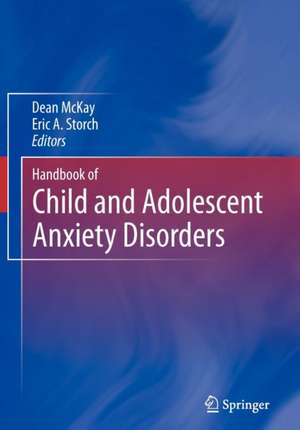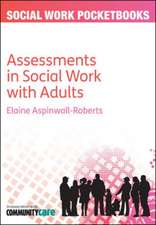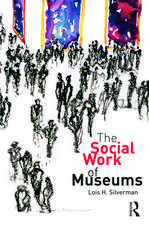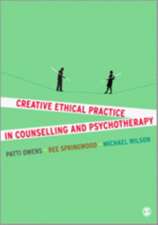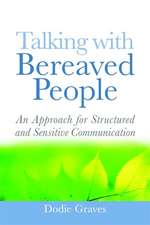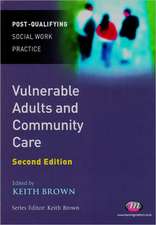Handbook of Child and Adolescent Anxiety Disorders
Editat de Dean McKay, Eric A. Storchen Limba Engleză Paperback – 25 sep 2012
| Toate formatele și edițiile | Preț | Express |
|---|---|---|
| Paperback (2) | 1401.75 lei 6-8 săpt. | |
| Springer – 25 sep 2012 | 1401.75 lei 6-8 săpt. | |
| Springer International Publishing – 30 noi 2023 | 2105.05 lei 6-8 săpt. | |
| Hardback (1) | 2111.56 lei 6-8 săpt. | |
| Springer International Publishing – 30 noi 2022 | 2111.56 lei 6-8 săpt. |
Preț: 1401.75 lei
Preț vechi: 1709.45 lei
-18% Nou
Puncte Express: 2103
Preț estimativ în valută:
268.25€ • 278.47$ • 223.68£
268.25€ • 278.47$ • 223.68£
Carte tipărită la comandă
Livrare economică 22 martie-05 aprilie
Preluare comenzi: 021 569.72.76
Specificații
ISBN-13: 9781441977830
ISBN-10: 144197783X
Pagini: 532
Ilustrații: XIX, 532 p. 35 illus.
Dimensiuni: 178 x 254 x 28 mm
Greutate: 1.04 kg
Ediția:2011
Editura: Springer
Colecția Springer
Locul publicării:New York, NY, United States
ISBN-10: 144197783X
Pagini: 532
Ilustrații: XIX, 532 p. 35 illus.
Dimensiuni: 178 x 254 x 28 mm
Greutate: 1.04 kg
Ediția:2011
Editura: Springer
Colecția Springer
Locul publicării:New York, NY, United States
Public țintă
Professional/practitionerCuprins
Dedication.- About the Editors.- List of Contributors.- Section I: Foundations in Child & Adolescent Anxiety.- Classification of Child & Adolescent Anxiety Disorders.- Issues in Differential Diagnosis: Phobias and Phobic Conditions.- Issues in Differential Diagnosis: Considering Generalized Anxiety Disorders, Obsessive-Compulsive Disorder, and Posttraumatic Stress Disorder.- Section II: Diagnostic Components in Child/Adolescent Anxiety Disorders.- Cognitive Behavioral Models of Phobias and Pervasive Anxiety.- Genetics of Childhood and Adolescent Anxiety.- Neuropsychological Considerations in Child and Adolescent Anxiety.- Empirical Approaches to the Study of Latent Structure and Classification of Child and Adolescent Anxiety Psychopathology.- Dimensional Diagnosis of Anxiety in Youth.- Section III: Ancillary Components of Child & Adolescent Anxiety.- Differential Diagnosis and Comorbid ADHD in Childhood Anxiety.- Comorbid and Secondary Depression.- The Role of Disgust in Childhood Anxiety Disorders.- Emotion Regulation in Childhood Anxiety.- Emergent Personality Disorders among Adolescents with Anxiety Disorders.- Temperament and Anxiety Disorders.- Parenting and Child Anxiety Disorders.- Section IV: Psychological and Pharmacological Treatments of Child/Adolescent Anxiety Disorders.- Specific Phobias.- Separation Anxiety Disorder.- Generalized Anxiety Disorder.- Selective Mutism.- Social Anxiety.- Pediatric Posttraumatic Stress Disorder.- Obsessive-Compulsive Disorder.- Pharmacological Treatment for Phobias and Anxiety Disorders.- Pharmacologic Approaches to Medication-Resistant Anxiety in Children and Adolescents.- Psychopharmacological Treatment of Anxiety in Adolescents with Comorbid Substance Abuse.- Combined Psychological and Pharmacological Treatment of Pediatric Anxiety Disorders.- Section V: Special Populations and Additional Treatment Elements.- Parent Training for Childhood Anxiety.- School-Based Interventions for Anxiety in Youth.- Phobias and Anxiety-Related Problems in Mental Retardation and Developmental Disabilities.- Food Neophobia in Children: Misnomer, Anxious Arousal, or Other Emotional Avoidance?.- Social Disability and Impairment in Childhood Anxiety.- Anxiety Disorders in Children with Chronic Health Problems.- Immune and Endocrine Function in Child and Adolescent Obsessive Compulsive Disorder.
Recenzii
“This book is destined to become the standard reference on anxiety disorders as they manifest in childhood. The editors, McKay and Storch, are authorities on childhood anxiety and have done a masterful job editing a large volume of work, creating a book that is both comprehensive and accessible – to clinicians, students and researchers.”
Wayne K. Goodman, M.D.
Esther and Joseph Klingenstein Professor and Chair of Psychiatry/Professor of Neuroscience
Mount Sinai School of Medicine
“McKay and Storch have brought together a who’s who of the leading researchers and clinicians to provide a comprehensive overview of child anxiety disorders. Authors provide state-of-the art information on a wide-variety of topics including assessment, CBT, family and psychopharmacological treatments, and anxiety in developmentally disabled and chronic health impaired youngsters. This book is an invaluable guide to clinicians, researchers, students, and others working with anxious youth and their families.”
John Piacentini, Ph.D., ABPP
Professor of Psychiatry and Biobehavioral Sciences/Director, Child OCD, Anxiety, and Tic Disorders Program
UCLA Semel Institute for Neuroscience and Human Behavior
Wayne K. Goodman, M.D.
Esther and Joseph Klingenstein Professor and Chair of Psychiatry/Professor of Neuroscience
Mount Sinai School of Medicine
“McKay and Storch have brought together a who’s who of the leading researchers and clinicians to provide a comprehensive overview of child anxiety disorders. Authors provide state-of-the art information on a wide-variety of topics including assessment, CBT, family and psychopharmacological treatments, and anxiety in developmentally disabled and chronic health impaired youngsters. This book is an invaluable guide to clinicians, researchers, students, and others working with anxious youth and their families.”
John Piacentini, Ph.D., ABPP
Professor of Psychiatry and Biobehavioral Sciences/Director, Child OCD, Anxiety, and Tic Disorders Program
UCLA Semel Institute for Neuroscience and Human Behavior
Notă biografică
Dean McKay, Ph.D., ABPP, is Professor, Department of Psychology, Fordham University. He currently serves on the editorial boards of Behaviour Research and Therapy, Behavior Modification, and Journal of Anxiety Disorders and is Associate Editor of Journal of Cognitive Psychotherapy (term beginning 2008). He has published more than 130 journal articles and book chapters and has more than 150 conference presentations. Dr. McKay has been a member of the Obsessive Compulsive Cognitions Working Group since 1995. He is Board Certified in Behavioral and Clinical Psychology of the American Board of Professional Psychology (ABPP), is a Fellow of the American Board of Behavioral Psychology and the Academy of Clinical Psychology, as well as a Clinical Fellow of the Behavior Research and Therapy Society. He is also a Fellow of the American Psychological Association (Divisions 5 (Measurement, Evaluation, and Statistics), 12 (Clinical), 29 (Psychotherapy), and 42 (Community of Psychologists in Independent Practice) and the American Psychological Society. Dr. McKay has edited or co-edited eight books dealing with treatment of complex cases in children and adults, obsessive-compulsive disorder, disgust in psychopathology, and research methodology. His research has focused primarily on Obsessive-Compulsive Disorder (OCD), Body Dysmorphic Disorder, and Hypochondriasis and their link to OCD as well as the role of disgust in psychopathology. His research has also focused on mechanisms of information processing bias for anxiety states. Dr. McKay is also director and founder of Institute for Cognitive Behavior Therapy and Research, a private treatment and research center in Westchester County, New York.
Eric A. Storch, Ph.D., is an Associate Professor and Guild Endowed Chair in the Departments of Pediatrics and Psychiatry, University of South Florida. He holds a joint appointment in the Department of Psychology. He currently serves on the editorial boards of Journal of Clinical Child and Adolescent Psychology, Child Psychiatry and Human Development, Journal of Child Health Care, Psicologia Conductual, and Journal of Anxiety Disorders. He has published more than 190 peer-reviewed journal articles and book chapters and has given more than 150 conference presentations. In addition to his peer-reviewed articles, Dr. Storch has edited or co-edited three books dealing with treatment of complex cases in children, obsessive-compulsive disorder, and childhood anxiety. He has received grant funding for his work in OCD, related disorders (e.g., tics), and anxiety from the National Institutes of Health, CDC, Obsessive Compulsive Foundation, Florida Department of Health, pharmaceutical companies, Tourette Syndrome Association, and National Alliance for Research on Schizophrenia and Affective Disorders (NARSAD). In addition to treatment outcome, Dr. Storch has specific research interests in treatment augmentation and dissemination. He directs the cognitive-behavioral therapy component at the University of South Florida Obsessive-Compulsive Disorder Program and is highly regarded for his treatment of pediatric and adult OCD patients.
Eric A. Storch, Ph.D., is an Associate Professor and Guild Endowed Chair in the Departments of Pediatrics and Psychiatry, University of South Florida. He holds a joint appointment in the Department of Psychology. He currently serves on the editorial boards of Journal of Clinical Child and Adolescent Psychology, Child Psychiatry and Human Development, Journal of Child Health Care, Psicologia Conductual, and Journal of Anxiety Disorders. He has published more than 190 peer-reviewed journal articles and book chapters and has given more than 150 conference presentations. In addition to his peer-reviewed articles, Dr. Storch has edited or co-edited three books dealing with treatment of complex cases in children, obsessive-compulsive disorder, and childhood anxiety. He has received grant funding for his work in OCD, related disorders (e.g., tics), and anxiety from the National Institutes of Health, CDC, Obsessive Compulsive Foundation, Florida Department of Health, pharmaceutical companies, Tourette Syndrome Association, and National Alliance for Research on Schizophrenia and Affective Disorders (NARSAD). In addition to treatment outcome, Dr. Storch has specific research interests in treatment augmentation and dissemination. He directs the cognitive-behavioral therapy component at the University of South Florida Obsessive-Compulsive Disorder Program and is highly regarded for his treatment of pediatric and adult OCD patients.
Textul de pe ultima copertă
Is it school refusal or separation anxiety disorder? Can preschoolers have panic attacks? Does food neophobia really exist? For readers seeking ways to improve assessment, case conceptualization, or treatment plans as well as a more general understanding of anxiety disorders among children, the Handbook of Child and Adolescent Anxiety Disorders addresses these and many other complex issues. A straightforward companion to the diagnostic manuals, this volume crosses theoretical boundaries to describe in depth the wide range of children’s anxiety disorders and to explain the developmental nuances that separate them from their adult analogues.
Coverage includes:
Coverage includes:
- Diagnostic and etiological models of children’s anxiety disorders (i.e., genetic, cognitive-behavioral, taxonomic, neuropsychological, dimensional).
- Differential diagnosis guidelines for generalized anxiety disorder (GAD), phobic conditions, obsessive-compulsive disorder (OCD), and posttraumatic stress disorder (PTSD) in youth.
- Ancillary factors in child and adolescent anxiety (e.g., personality, temperament, parenting issues, and comorbid conditions).
- Psychological, pharmacological, and combined treatments for childhood anxiety disorders.
- Special populations and emerging areas of interest, including anxiety disorders in the contexts of chronic health problems and developmental disabilities.
Caracteristici
Provides a comprehensive text with the latest information on treatment, assessment, treatment augmentation, and basic science
Addresses comorbid and complicating factors in treating children and adolescents with anxiety disorders
Discusses cutting-edge controversies in the field of anxiety disorders, such as the placement of OCD in the DSM-V and novel augmentation approaches to behavioral therapy
Includes supplementary material: sn.pub/extras
Addresses comorbid and complicating factors in treating children and adolescents with anxiety disorders
Discusses cutting-edge controversies in the field of anxiety disorders, such as the placement of OCD in the DSM-V and novel augmentation approaches to behavioral therapy
Includes supplementary material: sn.pub/extras
